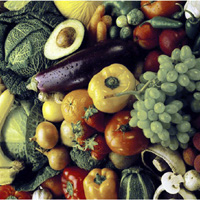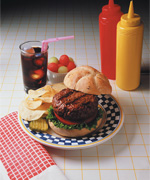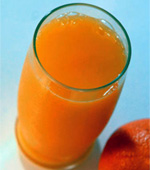Dr Lawrence Plaskett is vice chair of the Nutritional Council in Britain. After a degree in biochemistry at Cambridge, a doctorate at London University and a number of years in food companies and Government agencies, Dr Plaskett turned his extensive knowledge to updating the Gerson Therapy. His argument was simple. Dr Gerson was brilliant but since his death over 40 years ago much more has been learned about nutrition and biochemistry.
 A nutritional approach to cancer should be nationally available
A nutritional approach to cancer should be nationally available
It is Plaskett’s firmly held view that a nutritional approach to cancer should be nationally available. More fundamentally he argues that orthodox authorities are already in full acceptance that nutrients can protect against the inception of cancer1. And that various sources indicated that up to 60 per cent of cancers appear to have nutritional cause.
This may or may not be the case. Indeed, cancer development is a multi-stop process and nutrition, or rather poor nutrition, may be a factor in virtually all cancers, even if other factors are more damaging.
As a biochemist he sites research showing, for example, that
»Flavenoids such as quercetin (onions) stop the proliferation of cancer cells in vitro, especially if vitamin C is present (Kandaswami)
»Quercetin and genistein (a soya isoflavone) are the most potent anti-proliferating flavenoids in colon cancer (Kno)
»Quercetin has potential in the treatment of leukaemia (Teofil)
»Catechins in green tea reduce size of human prostate and mammary tumours (Liao)
»Beta-carotene and vitamin C influence the survival of women with breast cancer (Ingram BJC 1994)
»Lycopene (tomatoes) inhibits prostate cell growth, as do beta-carotene, canthavanthin and retinoic acid. Coenzyme Q10 produces good results with breast cancers (Lockwood 1994).
Plasket argues that many recent scientific discoveries have proven that Gerson was, indeed, right and considerably "ahead of his time". His research into the latest scientific studies has supported, for example, the importance of omega 3 (from fish oils and linseed oil) as an essential element in the good health of cells; the use of coffee enemas to induce raised levels of glutathione S-transferases, the enzymes of liver detoxification; the use of high potassium and digestive enzymes.

There is no need for castor oil, iodine and iodide, dried thyroid, liver juices and liverinjections

Where he feels recent studies have added to Gerson is that there is no need for castor oil, iodine and iodide, dried thyroid, liver juices and liver injections. Instead he recommends a very detailed and precise list of supplements, some of which vary according to the cancer (see Appendix).
Plaskett is very open and honest about what is still unknown about the particular ingredients of plants, vegetables and fruits that might be protective probably because he is such a precise man.
He sites carotenoids, flavanoids, indoles, thiocyanates, ellagic acid, commarins and limonaids as protective, but given that there are 4000 flavenoids known to science for starters he is honest enough to conclude that exactly which ones are the best, and how much should be taken of each is imprecise. With quercitin he adds that large quantities of onions might not be too good for the digestion or even breathe, but supplements (which are available) might lack important "assisting" micronutrients.
Plaskett included in his therapy:
»coffee enemas (but less than Gerson)
 »fruit and vegetables (but less than Gerson)
»fruit and vegetables (but less than Gerson)
»potassium (as Gerson), plus magnesium in addition to ensure that the sodium pump worked effectively
»linseed oil (as Gerson) plus fish oil
»digestive enzymes (as Gerson) but supplemented by amino acids
»bowel flora bacteria (not used by Gerson)
»aloe vera (not used by Gerson) - it stimulates the immune system and is a glycoprotein (see later)
»high fruit and vegetables but concentrating on them with scientific evidence
»adjustment of therapy to certain different cancers - e.g. the use of soya for hormonal cancers
»the use of very specific levels of certain supplements.
His scientific studies have led him to seven areas for inclusion in his therapy.
- Antioxidants - using vitamins E, C, curcuminoids from turmeric, Coenzyme Q10, and multiple carotenoids and flavenoids.
- Anti-proliferating agents to slow down cancer proliferation e.g. flavenoids, carotenoids, vitamin A, curcuminoids.
- Detoxifying - e.g. organic sulphides from garlic, thiocyanates from brassicas and magnesium to increase glutathione levels.
- Differentiators - to induce cancer cells to become more "normal" e.g. bromelain (from pineapple), zinc, s-allyl cysteine (from garlic).
- Inhibitors of metastatis - stopping cancer spreading, e.g. bromelain, soya.
- Immune stimulation - e.g. aloe vera, bromelain, vitamins and minerals.
- Angiogenesis inhibitors - inhibiting growth of new blood vessels needed by tumours, e.g. soya bean genistein, garlic.
The therapy is vigorously vegan. Dairy products, eggs, fish and meat are vigorously excluded. A low protein diet has been shown to be effective against cancer (Tannenbaum). All fried foods are avoided, as are processed foods.

The therapy is vigorously vegan

Fresh vegetable intake is high, but uses only those with proven phytonutrients with anti-cancer properties e.g. garlic, cabbage, red-leaved lettuce, carrots, celery, parsnips, parsley, onions (red and green), tomato, aubergine, broccoli, cucumber, kale, cauliflower, sweet potatoes, radishes, Brussel sprouts, endive, watercress, capsicum peppers.
Herbs and spices are used: liquorice, ginger, turmeric, mint, horseradish, oregano, rosemary, sage, thyme, chives, basil, mustard and tarragon (all organic).
Plaskett even provides a list of daily requirements:
 Garlic 10 gms
Garlic 10 gms
Fresh onion 100-150 gms
Fresh tomato 200 gms
Turmeric powder 5 gms
Pulses-fresh and dried peas, lentils, chickpeas and beans 40 gms
Soya (only included if the cancer is hormonal)
Nuts and seeds are avoided to minimize fat and protein intake
Oats 50 gms
Brown rice 125 gms
Buckwheat
Barley
Fresh sweet corn
Occasionally potatoes - bake and boiled - freely used
No tea or coffee - but dandelion, organic Japanese green tea, rosibosch tea are allowed
Forbidden foods include:
 Sugar of all kinds (including honey, syrup, jams)
Sugar of all kinds (including honey, syrup, jams)
Textured soya Confectionary
Chocolate Ice cream
Fizzy soft drinks
Squashes
Alcohol
Yeasts
Oxo
Marmite
Bovril
Modified foods
No fats (because it activates carcinogens) other than a limited amount of linseed oil and fish oil (both for omega 3)
Dried fruit (it contains sulphite)
Juices consist of six per day (all freshly squeezed)

- glass of orange juice
- glasses of leaf juice (endive, watercress, lettuce, green peppers, red cabbage)
- glasses of apple and carrot (1:1)
Some beetroot juice is also used.
Development
Of interest may be the nutritional developments in hand for the Plaskett Therapy.
»Brassica vegetables possess a number of anti-cancer agents. Even higher levels of some of these are found in germinating broccoli seeds.
»Some cultivations of garlic produce higher selenium levels and these bulbs have been linked with, for example, effective prevention of mammary tumours (Ip and Lisk). Garlic normally contains sulphide rather than selenium.
»Saffron has anti-cancer components crocin, picrocin and saframal.
»Shiitake mushrooms have 1:3 beta-glucan polysaccharide which has shown strong anti-cancer properties.
»Curcuminoids seem to exhibit more anti-cancer properties, the more research is done!
»Limonene-rich orange peel oil is also strong in anti-cancer properties although the oil may produce negatives too.
Clearly, here we are looking at a very detailed, disciplined and thoroughly prepared nutritional plan. The detail of supplements down to the exact number of milligrams is very different from the more casual juicing plan of Gerson.
Either way both Gerson and Plaskett fervently believe that nutrition if poor can cause cancer; and nutrition if perfected can restore health.
We would be wise to heed both men...